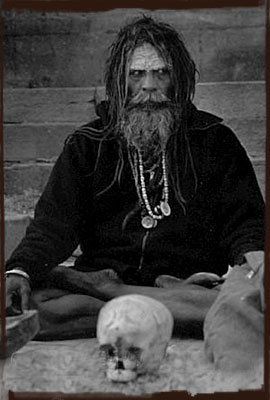Død, tantra og tiggermunke

En opbyggelig fortælling, jeg faldt over i forbindelse med lidt research i en helt anden retning.
CANNIBAL JOGI.
The other day, a jogi was brought up before the superintendent of the police, by the thanadar of Hatkholah, who stated, that the man had been seen devouring a corpse at Nimtollah Ghat, the place where the deceased Hindus are generally burnt. The cannibal was ordered to be sent out of the precincts of the town.
This is, perhaps, the climax of a systematic nuisance which we suffer, especially in those parts of the town inhabited by natives. This nuisance is created by those jogis and fakirs who are seen perambulating the streets in a state of almost perfect nudity, generally besmeared with ashes, and bedaubed with paints of different kinds; hale, hearty, and impudent fellows, who seem to boast in putting modesty to the blush, and, to our certain knowledge, of corrupting very many innocent young people.
Their principal mode of earning a livelihood is, either by compelling the natives to give them something hy making a clamour at their doors or before their shops, or by selling different roots, drugs, and charms, for the purpose of forcing nature to deviate from her usual course, and other abominations too horrible and improper to be mentioned in these pages.
The jogi who was perceived devouring the corpse, must have been one of the confraternity called Aghori, who infest almost every town in the Upper Provinces, especially Bihar. Their religion —if it can be called by that name— teaches them to act in every respect contrary to the rules of caste, which they despise, and going to the other extreme, they eat all manner of things, which even those who have no respect for the rules of caste do not approach.
Groups of those people may be seen in the native towns in the front of shops, perpetrating the most indecent deeds in the public streets ; and, collecting all manner of abominations in skulls, picked up on the banks of the river, they besmear their bodies with the abominable mixture, and eat it as if it were a savoury article of food. In this manner they continue in the front of each shop until they have succeeded in extorting such a sum from its owner as they please, and then remove to the next shop and do the same there. Should the shopkeeper be obstinate in refusing to comply with the demand of these wretches, they fix themselves before his shop, and spread filth and pieces of putrid carcases, brought from the river, all about the place, which effectually prevents every body from approaching the spot, and the owner of the shop must either comply with the request of the Aghori or quit his premises.
Should he attempt to molest the filthy besiegers of his shop, he has a very unequal battle to maintain; for to his nasal organ the Aghori will oppose the contents of the skulls about him, viz. pieces of putrid human flesh, and all manner of filthy things, which neither Hindu, Mussulman, nor any other person but an Aghori, would approach. We have heard of these people defending themselves against the clubs of the irritated shopkeepers, with the limbs and the hones of human carcases, and thus formidably armed, putting hundreds to flight. — Hurkmu, June 12.
This loathsome being was brought into the Zillah Court on the 19th June, on a cow-cart, with a large mob following him. On his being led in, we took the liberty of asking him what caste he belonged to. "Kutta ka Jaul," said the wretch [dvs., "hundekasten"], "because I feed on carcasses and corpses:" and then went on with a detail of the most disgusting nature. He, every now and then, scraped his teeth with a human rib bone, and, according to his own words, allayed thirst by sucking an arm bone, which he had suspended to his shoulder. He had a number of human bones round his neck, and on his breast he wore a human skull. Tied to his waist he had several bones of animals, and the skull of a dog attached to the band. His teeth, we remarked, were exceedingly white, and the enamel on them was surprisingly beautiful. He had a very pretty dog by him, on which, when hungry, he purposed feasting.
The magistrate ordered the disgusting wretch to be turned away, as giving him quarters at Tallygunge would be doing injustice to the inmates of it. —Ibid., June 23.
Kilde The Asiatic journal and monthly Register for British and Foreign India, British East Asia Company september-december 1837
Man kan læse mere om fænomenet her.
